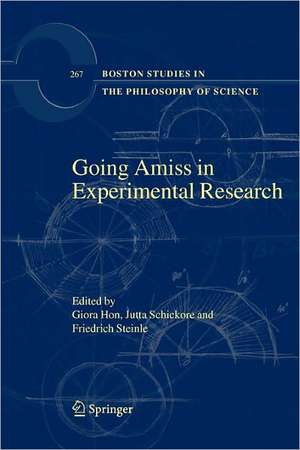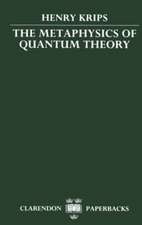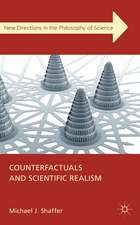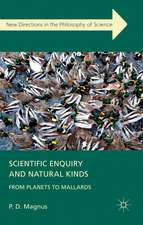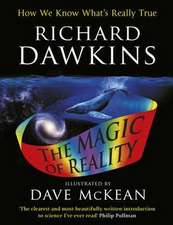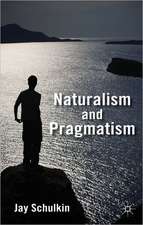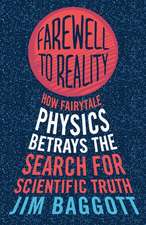Going Amiss in Experimental Research: Boston Studies in the Philosophy and History of Science, cartea 267
Editat de Giora Hon, Jutta Schickore, Friedrich Steinleen Limba Engleză Paperback – 22 oct 2010
This book will be of interest to historians, philosophers, and sociologists of science as well as to practicing scientists and science educators.
| Toate formatele și edițiile | Preț | Express |
|---|---|---|
| Paperback (1) | 640.06 lei 6-8 săpt. | |
| SPRINGER NETHERLANDS – 22 oct 2010 | 640.06 lei 6-8 săpt. | |
| Hardback (1) | 644.95 lei 6-8 săpt. | |
| SPRINGER NETHERLANDS – 7 ian 2009 | 644.95 lei 6-8 săpt. |
Din seria Boston Studies in the Philosophy and History of Science
- 18%
 Preț: 944.19 lei
Preț: 944.19 lei - 15%
 Preț: 646.75 lei
Preț: 646.75 lei - 15%
 Preț: 646.75 lei
Preț: 646.75 lei - 15%
 Preț: 699.28 lei
Preț: 699.28 lei - 18%
 Preț: 736.50 lei
Preț: 736.50 lei - 18%
 Preț: 706.87 lei
Preț: 706.87 lei - 15%
 Preț: 643.16 lei
Preț: 643.16 lei - 15%
 Preț: 650.69 lei
Preț: 650.69 lei - 15%
 Preț: 634.18 lei
Preț: 634.18 lei - 15%
 Preț: 642.68 lei
Preț: 642.68 lei -
 Preț: 391.40 lei
Preț: 391.40 lei -
 Preț: 383.33 lei
Preț: 383.33 lei - 18%
 Preț: 944.19 lei
Preț: 944.19 lei - 18%
 Preț: 955.56 lei
Preț: 955.56 lei - 15%
 Preț: 643.65 lei
Preț: 643.65 lei -
 Preț: 392.75 lei
Preț: 392.75 lei - 18%
 Preț: 1229.10 lei
Preț: 1229.10 lei - 18%
 Preț: 1238.23 lei
Preț: 1238.23 lei - 18%
 Preț: 951.29 lei
Preț: 951.29 lei - 18%
 Preț: 1223.25 lei
Preț: 1223.25 lei - 18%
 Preț: 1225.79 lei
Preț: 1225.79 lei - 18%
 Preț: 1226.42 lei
Preț: 1226.42 lei - 18%
 Preț: 1236.82 lei
Preț: 1236.82 lei - 15%
 Preț: 644.49 lei
Preț: 644.49 lei - 18%
 Preț: 1231.78 lei
Preț: 1231.78 lei - 15%
 Preț: 644.30 lei
Preț: 644.30 lei - 18%
 Preț: 957.62 lei
Preț: 957.62 lei - 18%
 Preț: 1222.49 lei
Preț: 1222.49 lei - 18%
 Preț: 947.50 lei
Preț: 947.50 lei - 18%
 Preț: 1833.95 lei
Preț: 1833.95 lei - 18%
 Preț: 1227.99 lei
Preț: 1227.99 lei - 18%
 Preț: 947.35 lei
Preț: 947.35 lei
Preț: 640.06 lei
Preț vechi: 753.01 lei
-15% Nou
Puncte Express: 960
Preț estimativ în valută:
122.49€ • 126.91$ • 102.23£
122.49€ • 126.91$ • 102.23£
Carte tipărită la comandă
Livrare economică 22 martie-05 aprilie
Preluare comenzi: 021 569.72.76
Specificații
ISBN-13: 9789048180196
ISBN-10: 9048180198
Pagini: 288
Ilustrații: X, 277 p.
Dimensiuni: 155 x 235 x 15 mm
Greutate: 0.41 kg
Ediția:Softcover reprint of 1st ed. 2009
Editura: SPRINGER NETHERLANDS
Colecția Springer
Seria Boston Studies in the Philosophy and History of Science
Locul publicării:Dordrecht, Netherlands
ISBN-10: 9048180198
Pagini: 288
Ilustrații: X, 277 p.
Dimensiuni: 155 x 235 x 15 mm
Greutate: 0.41 kg
Ediția:Softcover reprint of 1st ed. 2009
Editura: SPRINGER NETHERLANDS
Colecția Springer
Seria Boston Studies in the Philosophy and History of Science
Locul publicării:Dordrecht, Netherlands
Public țintă
Professional/practitionerCuprins
Introduction: Mapping “Going Amiss”.- Introduction: Mapping “Going Amiss”.- Error as an Object of Study.- Error: The Long Neglect, the One-Sided View, and a Typology.- Error as Historiographical Challenge: The Infamous Globule Hypothesis.- Learning From Error.- Learning Without Error.- Living Extremely Flat: The Life of an Automaton; John von Neumann’s Conception of Error of (in)Animate Systems.- Concepts and Dead Ends.- Experimental Reorientations.- Concepts from the Bench: Hans Krebs, Kurt Henseleit and the Urea Cycle.- How Experiments Make Concepts Fail: Faraday and Magnetic Curves.- A Pioneer Who Never Got It Right: James Dewar and the Elusive Phenomena of Cold.- Instrumental Artifacts.- Distinguishing Real Results from Instrumental Artifacts: The Case of the Missing Rain.- Going Right and Making It Wrong: The Reception of Fizeau’s Ether-Drift Experiment of 1859.- The Spectrum of ? Decay: Continuous or Discrete? A Variety of Errors in Experimental Investigation.- Surprise and Puzzlement.- The Scent of Filth: Experiments, Waste, and the Set-Up.- In the Thick of Organic Matter.
Textul de pe ultima copertă
Like any goal-oriented procedure, experiment is subject to many kinds of failures. These failures have a variety of features, depending on the particulars of their sources. For the experimenter these pitfalls should be avoided and their effects minimized. For the historian-philosopher of science and the science educator, on the other hand, they are instructive starting points for reflecting on science in general and scientific method and practice in particular. Often more is learned from failure than from confirmation and successful application. The identification of error, its source, its context, and its treatment shed light on both practices and epistemic claims. This book shows that it is fruitful to bring to light forgotten and lost failures, subject them to analysis and learn from their moral. The study of failures, errors, pitfalls and mistakes helps us understand the way knowledge is pursued and indeed generated. The book presents both historical accounts and philosophical analyses of failures in experimental practice. It covers topics such as "error as an object of study", "learning from error", "concepts and dead ends", "instrumental artifacts", and "surprise and puzzlement".
This book will be of interest to historians, philosophers, and sociologists of science as well as to practicing scientists and science educators.
This book will be of interest to historians, philosophers, and sociologists of science as well as to practicing scientists and science educators.
Caracteristici
Draws out the productivity of failure and dead ends in knowledge generation Offers a realistic image of "the scientific method" Combines historical and philosophical approaches to scientific experimentation
